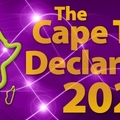Diplomatic Mission to Represent Science is not an Illusion
The audience that gathered to listen to a WSF section meeting where the topic discussed was the role of scientists on diplomatic missions to help contain international crises and create peaceful cooperation between countries of differing cultures and technical development was too large to fit in the room without keeping the door ajar. The chair of the session also attended by experts from Iran, Israel, the Palestine Authority, Egypt, Rwanda and the USA was Katalin Bogyay, Hungary's permanent ambassador to UNESCO from Hungary. This is what she had to say to mta.hu.
Perhaps the most interesting minutes of the session came when Israeli scientist Dan Bitan and Palestinian scientist Hassan Dweik delivered their lectures. It became clear that although they work together on a number of shared projects back home, when it comes to judge some specific issues such as sharing water resources, their wording seemed to reflect differences of opinions and arguments as compared to Palestinian and Israeli official standpoints. Having said that, don't you think that going on diplomatic missions on behalf of international science is nothing but shooting at a moving target?
Not at all... Both the supreme powers and the small states make use of non-aligned means of diplomacy such as culture and science – for various reasons. On the one hand, because those forms of diplomatic moves are directly related to the people living in certain territories, and they may not always be in line with current political advances. The essence, or if you like the fundamental attribute of going to diplomatic missions to represent the stands of science is that that move is concerned with the lives of people, and it has a long-term agenda for the sake of which it creates connections, raises bridges between peoples, countries and cultures. All that is to help us all really understand each other. I believe this is not naivety on my behalf.
It is not by chance that for example the so called "soft power" has gained special importance in the diplomacy of the US! If you visit Oman or other corners of the world, the first thing you notice is the amount of energy invested in cultural and scientific diplomacy. That is because such moves could bring people and nations a lot closer than any other mode of human interaction.
Can scientific and cultural diplomacy show any specific trait of its own? Or is it "only" an exercise in talking on conferences and exchanging experiences?
Well, it is not a self-centred activity: diplomatic steps on behalf of science and culture have a continuous flow of accomplishments to be proud of. Even here and now at this section of the larger meeting we heard specific results; inter alia those rooted in the common efforts of some affected scientists despite the Palestinian-Israeli conflict. I may also recall the conflict between Cambodia and Thailand that has grown into a political war, an armed conflict that may have been ended by using our moves in diplomacy.
Scientific diplomacy follows a different pattern than traditional diplomacy where the parties are determined to enforce their interest even at the price of exercising naked power. In contrast, our diplomatic mission is aimed at initiating a dialogue and cooperation that requires a different mental framework and a different set of tools. But we do find that such techniques are wanted all over the world, because quite often, when used, they can undo the deadly gridlock that has not been possible to deal with any further by traditional diplomacy.
To put it simply: scientific diplomacy is an instrument for big political players or at least is an accessory to making that palatable? Would that be your mission?
Well, I would not say so. Assisting Big Politics would only mean giving support for achieving goals of current, immediate interest. I need to repeat: diplomacy on behalf of world science, just as world culture, has a long-term vision for humankind. This is why you may hear that UNESCO is the top institute in this world for the diplomatic defence of cultures and science, because that organisation is established to facilitate cooperative efforts in science, education, culture and communication in order to have peace and security for all.





